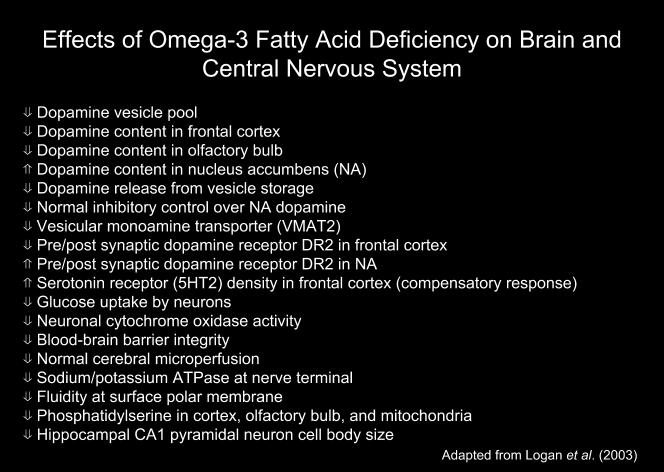 Increasingly, omega-3 fatty acids are being seen as pivotal to mental health. Omega-3 fatty acids are of interest nutritionally because evidence shows that dietary intakes of these fats are falling, and this has lead to a serious imbalance between the omega-3 and omega-6 fatty acids. Both omega-3 and omega-6 fatty acids are beneficial to the health because they have vitamin like effects. However, the imbalance that exists in the typical Western diet, whereby too many omega-6 fats are supplied in relation to to few omega-3 fatty acids, causes a situation where proinflammatory cytokines are produced in tissues and this is a cause of disease. The solution to this problem is to reduce the omega-6 fatty acid content of the diet by the avoidance of excessive intakes of omega-6 rich vegetable oils, and at the same time increase the omega-3 fatty acid content of the diet through consumption of more omega-3 containing foods such as fish, walnut, green leafy vegetables and algal sources of omega-3 fatty acids.
Increasingly, omega-3 fatty acids are being seen as pivotal to mental health. Omega-3 fatty acids are of interest nutritionally because evidence shows that dietary intakes of these fats are falling, and this has lead to a serious imbalance between the omega-3 and omega-6 fatty acids. Both omega-3 and omega-6 fatty acids are beneficial to the health because they have vitamin like effects. However, the imbalance that exists in the typical Western diet, whereby too many omega-6 fats are supplied in relation to to few omega-3 fatty acids, causes a situation where proinflammatory cytokines are produced in tissues and this is a cause of disease. The solution to this problem is to reduce the omega-6 fatty acid content of the diet by the avoidance of excessive intakes of omega-6 rich vegetable oils, and at the same time increase the omega-3 fatty acid content of the diet through consumption of more omega-3 containing foods such as fish, walnut, green leafy vegetables and algal sources of omega-3 fatty acids.
The brain is particularly susceptible to an imbalance in the omega-3 to omega-6 fatty acid content of the diet because it contains high amounts of polyunsaturated fatty acids. Beneficial effects for omega-3 fatty acids have been shown in a number of diseases and disorders including Alzheimer’s disease, schizophrenia, depression, bipolar disorder, attention deficit hyperactivity disorder and autism. The treatment of depression and associated mood disorders with omega-3 fatty acids is interesting because rates of depression are increasing, and cheaper and safer alternatives to pharmaceutical drugs may be particularly beneficial to society. At the same time as rates of depression are increasing, intakes of omega-3 fatty acids have declined roughly during the same period. This has lead to speculation that low intakes of omega-3 fatty acids are a causative factor in the epidemic of depression currently seen in the Western nations of North America, Western Europe and Australasia.

Antidepressant drugs are best known for their ability to treat depression by causing increases in neurotransmitter levels in the brain, particularly serotonin. However, they may not function in this way. One possibility is that many of the antidepressant drugs function as antioxidants. This may help alleviate some of the damage caused by the inflammatory cytokines within the brain. Also some antidepressant drugs are also able to promote neurogenesis and may therefore be neuroprotective in parts of the brain such as the hippocampus and prefrontal cortex, which are through to be affected by depression. Long term administration of antidepressant may improve nerve growth through increases in proteins such as brain derived neurotrophic factor. This may explain why in the short term, antidepressants are able to increase neurotransmitter levels, but the antidepressant effect take many months to fully mature. Omega-3 fatty acids are beneficial to depression, probably because they limit the production of proinflammatory cytokines, and therefore have many of the same effects as antidepressant drugs.
That omega-3 fatty acids are protective of depression is evidenced by the lower incidence of depression seen in populations that consume higher intakes of fish. Fish are rich in omega-3 fatty acids and fish consumption appears to be a protective factor in the development of depression. Further, a higher intake of omega-3 fatty acids from mother’s milk is associated with lower rates of postpartum depression. In addition, the amount of omega-3 fatty acids present in the phospholipids of cells also correlates with the risk of depression, with those individuals with the highest omega-3 fatty acid content to their cell membranes having the lowest risk of depression. Where depression is present, those with the most omega-3 fatty acids in their cell membranes have the least severe forms of depression. There are also lower amounts of omega-3 fatty acids in the adipose tissue of depressed compared to healthy individuals. The available data therefore supports a role for omega-3 fatty acids as a protective factor in depression.
An imbalance in the omega-3 to omega-6 fatty acid content of the diet therefore may be involved in the formation of depression. That inflammation in the brain is associated with depression, and that imbalances in the omega-3 to omega-6 fatty acid content of the diet are also able to cause inflammation, has lead to speculation on the mechanism by which omega-3 fatty acids can benefit those with mood disorders. A number of factors can trigger the production of proinflammatory cytokines in the brain, including stress, trauma, infection, cardiovascular disease and cancer. The release of proinflammatory cytokines may then have a number of effects including reductions in neurotransmitter synthesis, reduction is tryptophan concentrations in the blood and activation of the hypothalamic-pituitary-adrenal (HPA) axis. By providing an anti-inflammatory environment, omega-3 fatty acids may reduce the release of proinflammatory cytokines and therefore may reduce the severity of the physiological changes in the brain.
Eat Well, Stay Healthy, Protect Yourself
RdB
